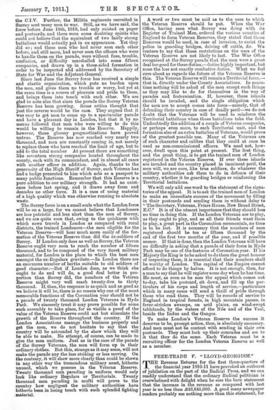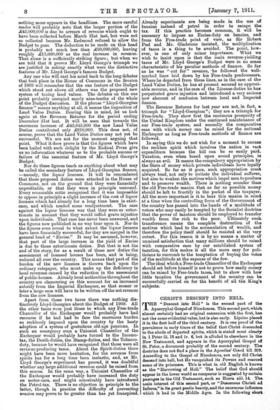FREE-TRADE V. " LLOYD-GEORGISM."
mwm Revenue Returns for the first three-quarters of the financial year 1910-11 have provoked an outburst of jubilation on the part of the Radical Press, and we can readily understand that the ordinary Radical politician is overwhelmed with delight when he sees the bare statement that the increase in the revenue as compared with last year is no less than £43,645,000. A good many newspaper readers probably see nothing more than this statement, for nothing more appears in the headlines. The more careful reader will probably note that the larger portion of the £43,000,000 is due to arrears of revenue which ought to have been collected before March 31st last, but were not so collected because Mr. Redmond refused to allow the Budget to pass. The deduction to be made on this head is probably not much less than £30,000,000, leaving roughly £13,000,000 as the real increase in revenue. That alone is a sufficiently striking figure ; but when we are told that it proves Mr. Lloyd George's triumph we are justified in asking exactly what were the distinctive features of Mr. Lloyd George's famous Budget. Any one who will cast his mind back to the long debates that took place in the House of Commons in. the Session of 1909 will remember that the one feature of the Budget which stood out above all others was the proposed new system of taxing land values. The debates on this one point probably occupied nearly nine-tenths of the whole of the Budget discussion. If the phrase "Lloyd-Georgian finance" means anything at all, it means the imposition of Land Value Duties. Bearing this in mind, let us look again at the Revenue Returns for the period ending December 31st last. It will be seen that towards the enormous increase of £43,645,000 the new Land Value Duties contributed only £210,000. This does not, of course, prove that the Land Value Duties may not yet be successful. We are not for the moment arguing that point. What it does prove is that the figures which have been hailed with such delight by the Radical Press give us no information whatever as to the probable success or failure of the essential feature of Mr. Lloyd George's Budget.
Nor do these figures teach us anything about what may be called the secondary feature of Lloyd.-Georgian finance, —namely, the liquor licenses. It will be remembered that these proposed duties were attacked in the House of Commons, not on the ground that they were financially unprofitable, or that they were in principle unsound. Every reasonable critic recognised that it was impossible to oppose in principle a slight increase of the cost of liquor licenses which had already for a long time been in exist- ence, and which needed some readjustment. The case against the liquor licenses was that they were so extor- tionate in amount that they would inflict grave injustice upon individuals. That case has never been answered, and the figures now published in no way bear upon it. Nor do the figures even reveal to what extent the liquor licenses have been financially successful, for they are merged in the general head of Excise." It may be assumed, however, that part of the large increase in the yield of Excise is due to these extortionate duties. But that is not the end of the story, for as a result of these new duties the assessment of licensed houses has been, and is being, reduced all over the country. This means that part of the burden of the new licenses is thrown back upon the ordinary ratepayer, who must make up the deficiency in local revenues caused by the reduction in the assessment of public-houses. Already local authorities throughout the country are clamouring on this account for an increased subsidy from the Imperial Exchequer, so that sooner or later a large sum will have to be written off the net revenue from the new licenses.
Apart from these two taxes there was nothing dis- tinctively Lloyd-Georgian about the Budget of 1909. All the other taxes were just those to which any Free-trade Chancellor of the Exchequer would probably have had recourse if he had. had to face the enormous burden so recklessly imposed upon the country by the hasty adoption of a system of gratuitous old-age pensions. In such an emergency even a Unionist Chancellor of the Exchequer would probably have turned to the Income- tax, the Death-duties, the Stamp-duties, and the Tobacco- duty, because he would have recognised that these were all revenue-producing taxes. About the Spirit-duties there might have been more hesitation, for the revenue from spirits has for a long time been inelastic, and, as Mr. Lloyd George's experiment has proved, it was doubtful whether any large additional revenue could be raised from this source. In the same way, a Unionist Chancellor of the Exchequer would probably have increased the duty on motor-cars, and might conceivably have introduced the Petrol-tax. There is no objection in principle to the latter, though in practice the difficulty of preventing evasion may prove to be greater than has yet transpired. Already experiments are being made in. the use of benzine instead of petrol in. order to escape the tax. If this practice becomes common, it will be necessary to impose an Excise-duty on benzine, and from the Free-trade point of view, as Sir Robert Peel and Mr. Gladstone insisted, the multiplication of taxes is a thing to be avoided. The point, how- ever, is one of only minor importance. What we wish to insist upon is that the main revenue-yielding taxes of Mr. Lloyd George's Budget were in no sense characteristic of his peculiar methods of finance. So far as he was "out for" revenue, -he followed the well. marked lines laid down by his Free-trade predecessors. Where he departed from these lines, as in the case of the Land Value Duties, he has at present secured no appreci- able revenue, and in the case of the License-duties he has perpetrated grave injustice and introduced a very serious new element of confusion between local and Imperial finance.
The Revenue Returns for last year are not, in fact, a triumph for " Lloyd-Georgism" ; they are a triumph for Free-trade. They show first the enormous prosperity of the United Kingdom under the continued maintenance of our Free-trade system, and secondly the comparative ease with which money can be raised for the national Exchequer as long as Free-trade methods of finance are followed.
In saying this we do not wish for a moment to excuse the reckless spirit which involves the nation in vast expenditure because the bill can be so easily paid. Taxation, even when based upon sound principles, is always an evil. It means the compulsory appropriation by the State of money which private individuals have legally acquired. So far as it goes, such appropriation must always tend, not only to irritate the individual sufferer, but also to weaken the motives which impel men to produce and to preserve wealth. There is nothing sounder than the old Free-trade maxim that as far as possible money should be left to fructify in the pocket of the taxpayer. All the more important is it to bear this maxim in. mind at a time when the controlling force of the Government of the country has passed into the hands of a multitude of voters who may easily be tempted by the Socialist doctrine that the power of taxation should be employed to transfer wealth from the rich to the poor. Ultimately such transference means the complete destruction of the motives which lead to the accumulation of wealth, and therefore the policy itself should be resisted at the very outset. For this reason it is by no means a matter of unmixed satisfaction that many millions should be raised with comparative ease by our established system of taxation, for this makes it all the more easy for poli- ticians to succumb to the temptation of buying the votes of the multitude at the expense of the few.
The ideal which a Free-trade Chancellor of the Exchequer should set before himself is not to prove how easily money can be raised by Free-trade taxes, but to show with how little taxation the government of the country can be successfully carried on for the benefit of all the King's subjects.



















































 Previous page
Previous page